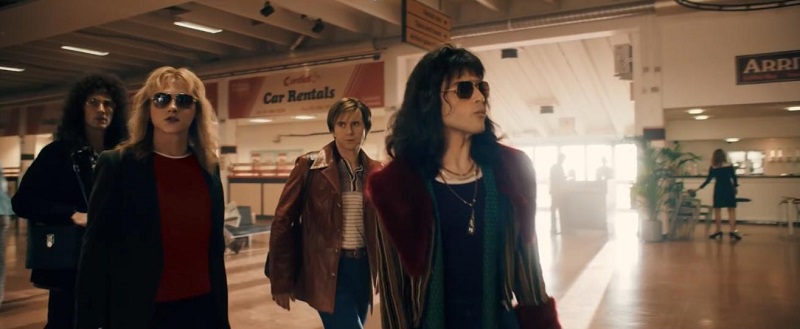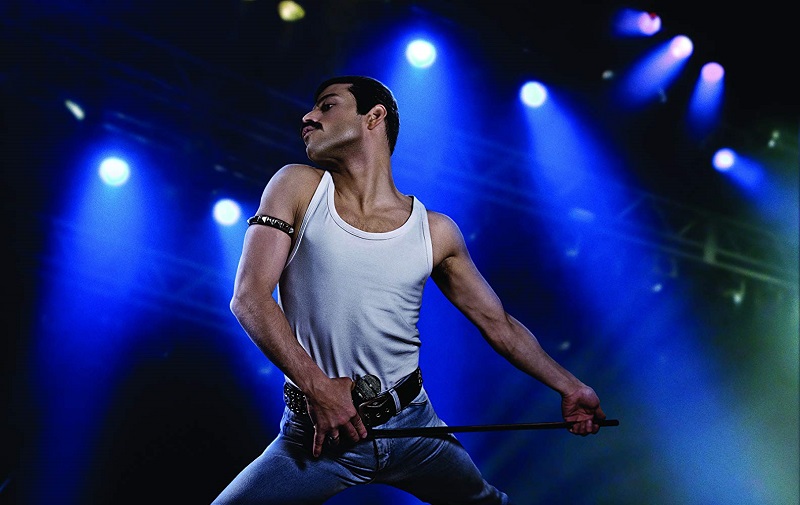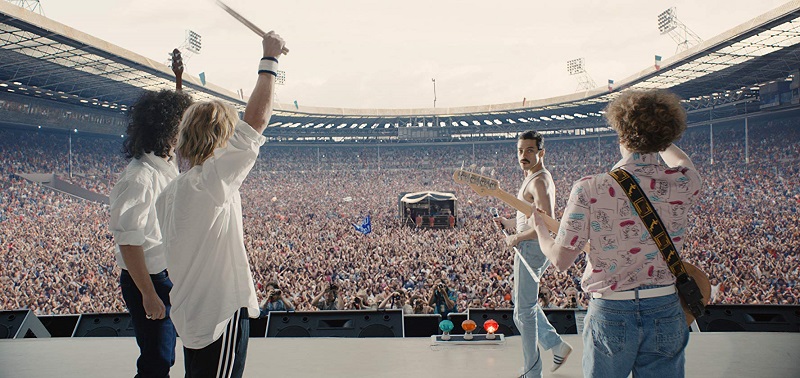The Freddie Mercury/Queen biopic has been in development hell for years, what with Sasha Baron Cohen slated to inhabit the rock icon in early stages. I love Cohen’s talent and he might have made a solid Mercury. But there is something to be said for timing being everything. Fate, the universe and all that other metaphysical stuff certainly chose this moment as the time for a film about Queen. Simply, that is due to the casting of Rami Malek as the rock star. It is a true match made in heaven.
Bohemian Rhapsody is a blast for two reasons—Malek’s magnificent performance and the music of the band itself. It is easy to get lost in the bloody brilliance of Queen’s catalog and toss aside any criticisms for the film itself. I mean, come on, who doesn’t want to hear Waiting for the Hammer to Fall in hi-def Dolby Cinema?!
What exists dramatically and emotionally in between those magical musical moments is what determines whether this is a musical biopic that hits all the high notes or one that is pitch-perfect sonically but leaves much to be desired existentially.
Director Bryan Singer left the production (or was forced out) about three-quarters of the way through filming and Dexter Fletcher (Eddie the Eagle) completed the feature. After the entire thing was edited and put together, it was decided that Singer would still get the directing credit. That mash-up of helmers might explain some of the softer touch given to the meatier part of putting Mercury’s life on the big screen.
The film commences in 1970 as drummer Roger Taylor (Ben Hardy) and guitarist extraordinaire Brian May (Gwilym Lee) are playing a pub gig with a lead singer/bassist who quits the outfit to pursue singing with another band. Luckily for them, you-know-who is in the audience and meets them after the gig to offer his services—completely unaware that their singer has quit. They are intrigued. Due to Mercury’s odd dental presence (which is actually explained in the film), the duo says that there is little chance that the man standing in front of them will ever embody the moniker “rock star.” Then… he sings.
As played out in Bohemian Rhapsody, fame and fortune (and everything that goes with it) comes quickly. For the sake of a film, that is just fine. As rock and roll groups go, Queen’s royal rise was indeed pretty rapid. Writers Anthony McCarten (who penned the script) and Peter Morgan (who co-wrote the story) do a solid job of giving us—for lack of a better word—the hits when it comes to the nitty-gritty of Queen history. Biopics tend to get too muddied in the details of the person profiled that filmmakers do not use their time wisely. What audiences get in Bohemian Rhapsody is the polar opposite.
The aspects of Mercury’s life that are the headline grabbers—such as his sexuality, marriage to Mary Austin and his subsequent selfish need to have her in his life, and of course his passing from AIDS in the early years of the disease, get their efficient due.
I wish that more attention had been paid to these tent poles of Mercury’s legend. If nothing else, it would have enriched the emotive command that the ensemble has over the audience. We still are firmly connected to all involved, especially Mercury. But it’s done in a manner that glides over elements that could have enriched the overall arc of the tale. The film is incredibly enlightening and entertaining still, and that largely has to do with the fact that Malek gives an Oscar nomination worthy portrayal. That is epic, given the fact that Mercury (and his band) is a soul in the pop culture lexicon that is one that everyone thinks they know. The actor rises above those expectations and anticipations of what is expected to be seen chronicling the legendary life of Farrokh Bulsara (Freddie’s given name).
Malek is splendid and he ought to be incredibly proud of the work he’s done. Mercury’s family should feel honored with the extraordinary effort it took for the I, Robot star to fully capture and encapsulate the rocker. Dare I say, Mercury himself is smiling down on Malek from heaven. He turns in a performance that goes beyond three-dimensions. It is not an imitation of a mimic of any realm. The choreography work done by Polly Bennett was priceless in filling in a rainbow of color to the man known for his flamboyant finesse on stage in front of millions.
The remainder of the cast is stellar, particularly the talented trio that fill out the band itself. Lee’s May does justice to the man who many believe (including me) is one of the best guitar players of all time. Hardy’s Taylor is a revelation in how the actor captured the percussionist’s (and singer tapped to nail those falsetto “Galileos” in the title track) modus operandi. If Mercury is the face and voice of the band. then May is the musical hammer, while bassist John Deacon (Joseph Mazzello) is the man who keeps things funky while providing a bit of the humor. Then there is Taylor. Beyond Mercury’s wide spotlight swath, the drummer is the literal and figurative heart of the band and the way that is captured in Bohemian Rhapsody is no accident.
After all, May and Taylor are producers of the film.
One could say that this is a classic case of the victors writing history. Mercury is sadly in the great beyond and Deacon was not involved in the project (or the band of late). Even though the drummer and guitarist are the ones delivering the cinematic history of the band, they never put too much pressure on those on the storytelling realm to elevate their role in Queen’s success or anything remotely in that landscape. Protecting the legacy and image of the band, on the other hand, is something that permeates through Bohemian Rhapsody and that is not necessarily a bad thing.
Some have argued that the film glosses over Mercury’s sexuality, hard-driving partying and even goes so far as to paint his sex life as reckless. The thing is, AIDs was not widely known about and was quietly being whispered about in gay circles and as such—not seen as anything one individual would be worried about daily. How Mercury acted, as portrayed in the film, is no different than what we have seen and expect from heterosexual rock stars. Just because he’s gay doesn’t mean that filmmakers have painted a picture of the Queen lead singer that leads a life that is dangerous at the most and risky at the least.
How filmmakers have bookended the film with Queen’s iconic Live Aid performance is a stroke of brilliance. It’s teased in the opening moments, and then by the time the viewer gets to the Bob Geldof organized benefit to combat African hunger, it is as if everything experienced up until this point was destiny-laden to deliver us to that Wembley Stadium stage. Rarely has a concert experience been captured in such a sensational way.
As a lifelong music aficionado, something struck us concerning basking in the glow of Queen for two-hours-and-fifteen-minutes. This is a band that is a musical chameleon.
They can rock, lord knows they can rock (Stone Cold Crazy). They can go electronic and work synthesizers (like in Radio Gaga and their work on the Flash Gordon soundtrack), but never went overboard which was the irresistible temptation in the 80s as that fresh technology permeated music. Queen can be operatic (Bohemian Rhapsody, Find Me Somebody to Love) and meld opera and rock (I Want it All). Then, they can touch those emotive chords that make one misty like nobody’s business—from Under Pressure to Who Wants to Live Forever? Heck, they can even channel Elvis Pressley (Crazy Little Thing Called Love).
As soon as the credits close, as much as Malek and his performance will rock you (pun intended) for days to come, it is actually the band’s work and its revolutionary place in music history that will be the largest takeaway from Bohemian Rhapsody.
Mercury saw his brothers in Queen as family. The idea of a solo career truly turned him off (even though he went down that road, painfully chronicled in the early third act in Bohemian Rhapsody). Therefore, one of the most moving aspects of the Queen biopic experience was discovering that Mercury’s self-described outcast had the most supportive, sensitive and enriching relationships with his brothers-in-rock—May, Taylor and Deacon.
Grade: B+




